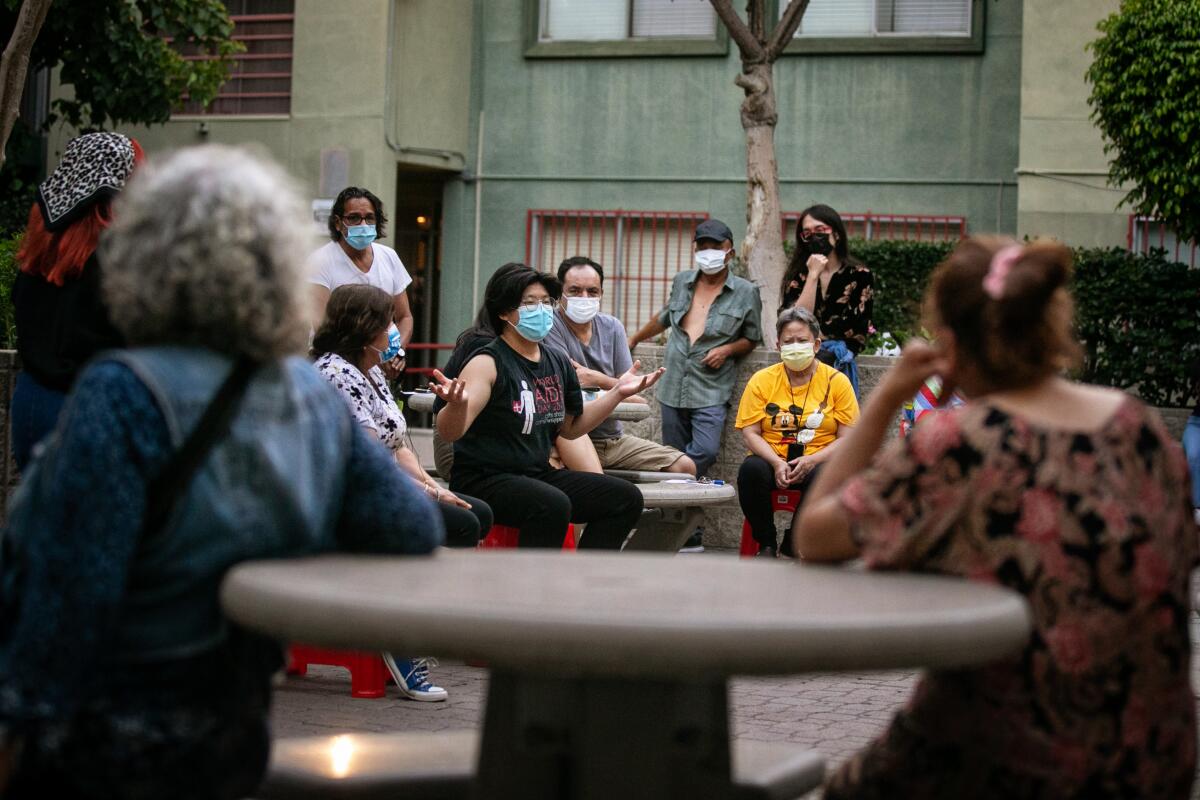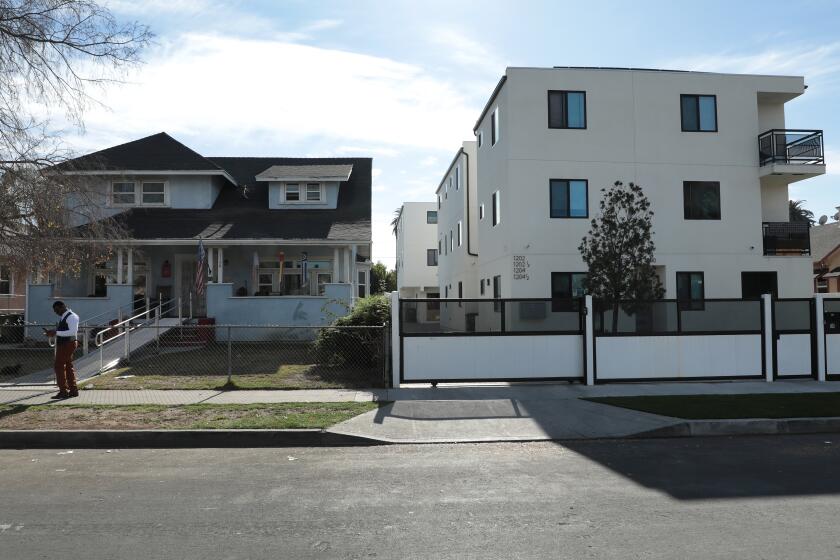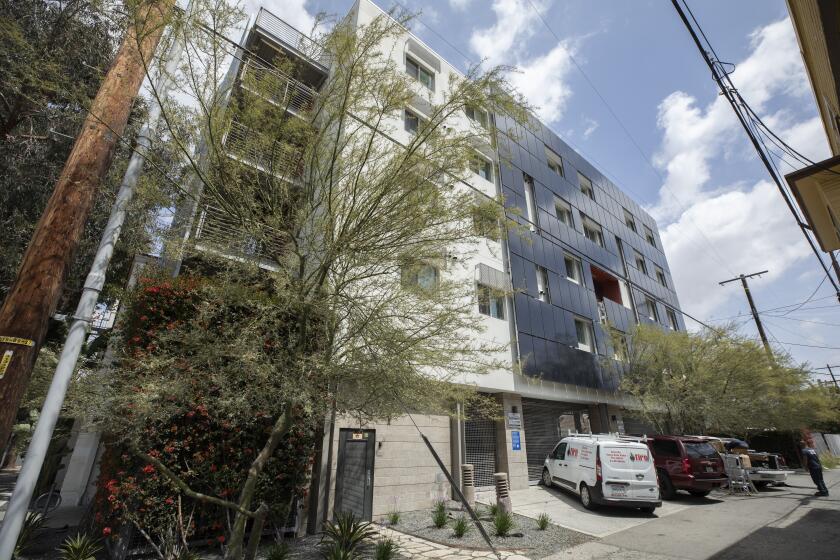Opinion: How tenant unions are finding power in numbers to fight L.A.’s housing crisis

Many Los Angeles residents struggle to stay in their homes. During the COVID-19 pandemic, the city instituted a moratorium on evictions. Since those restrictions ended in April 2023, evictions have skyrocketed well past pre-pandemic levels. According to the L.A. city controller’s data, landlords filed 5,652 evictions in December alone.
The city’s answer is to send tenants to the courts and provide them with bare-bones legal representation. Yet few people have actually gotten access to an attorney to help them fight eviction, and even then, burdened with excessive caseloads, these lawyers negotiate measly sums in exchange for tenants’ relocation rather than fighting for them to stay in their homes.
Mayor Karen Bass announced Executive Directive 1 as a signature policy to speed up affordable housing. But limiting it to multi-family neighborhoods is shortsighted.
But what if tenants fought their own battles in their own homes and in their own neighborhoods? As scholars studying the history of housing in L.A. and as organizers with the Union de Vecinos, a local branch of the Los Angeles Tenants Union, we have found that tenant unions are leading a more effective response to the region’s housing crisis.
In a tenant union, residents of an apartment complex join forces to represent their interests as a collective. Unlike the city’s delayed response to housing problems — which occurs only once residents reach the eviction stage or arrive at the courts — tenant unions are proactive. They negotiate directly with landlords and carry out protests, rent strikes, community events and other strategies to help protect their homes. And tenants get to be part of the conversation in solving the city’s housing woes.
The city put forth ambitious programs to meet California mandates for affordable housing — and then weakened them by exempting single-family neighborhoods.
There’s a long history of these unions leveraging their power in numbers.
In New York from 1917 to 1929, tenants used rent strikes to demand control over the quality and price of their homes — primarily by securing rent control. In our research, we discovered that by the 1960s and 1970s, poor tenants in public housing projects across the United States — from East St. Louis to San Francisco — organized. They used their collective power to push states to invest in making the projects habitable instead of just tearing them down.
In trying to prevent homelessness, the city and county have passed numerous measures that make it impossible for small landlords to function and will shut more renters out of the market.
Los Angeles has seen similar efforts. Since the 1990s, Union de Vecinos (neighbors’ union) has organized the primarily Latino, working-class community of Boyle Heights into committees that have used tactics such as community cleanups, rent strikes and protests to successfully fight gentrification. In 2015, Union de Vecinos helped found the Los Angeles Tenants Union, which now counts its membership across the city in the thousands and continues to win tenants the right to stay in their homes.
New local tenant union chapters have sprouted, including, most recently, among very low-income tenants living in downtown L.A.’s single-room occupancy hotels, the housing of last resort for many of the poorest Angelenos. Without consulting tenants, the city has plans to demolish SROs. But the tenants we’ve met have other ideas: organizing to demand not only that the historic hotels remain but also that they live up to their promise of providing safe, clean and healthy housing for low-income people.
Tenants who are behind on payments now face evictions, and landlords are likely to keep units empty for longer as they hold out for the most qualified applicants.
We’ve seen how tenants can curb plans to destroy existing low-income and rent-controlled housing. Last year in Boyle Heights, for example, a tenant association in Union de Vecinos discovered its rent-controlled building was slated for demolition to make way for a mixed-use housing development. But the tenant association was able to push L.A. City Councilmember Kevin De León to institute an interim ordinance to halt demolitions in the neighborhood.
COVID-19 eviction moratoriums at the federal, state and local levels cracked open a window of possibility for tenants facing displacement: Temporarily protected from evictions during the pandemic, they had time to organize, putting them in a better position to fight for their homes in the future. Across the country, tenant unions have blossomed, knitted together nationally through the Autonomous Tenants Union Network.
But tenants continue to face challenges, especially in Los Angeles, where several pandemic-era renter protection programs have ended. L.A. should formalize tenants’ power over their homes by reducing landlords’ power to evict, and by using eminent domain and other means to expropriate property from slumlords and transfer legal ownership to the tenants.
The tenant association at Hillside Villa, a 124-home apartment building in Chinatown, has been demanding this for years. The L.A. housing authority was slated to buy the property and then transfer ownership to the tenants, which would have saved them from a huge rent hike that, in practice, meant a mass eviction. But the city has dragged its feet. Now residents face eviction. The city could still step in and prevent hundreds of families from losing their homes.
The city should move toward policies that yield housing to the people who already inhabit it. Tenant unions are much more effective than landlords at solving precarious housing issues by preserving and enforcing renters’ rights, ensuring good living conditions and keeping tenants housed. In the state of emergency that constitutes L.A.’s housing crisis, city and county officials should begin to listen to and work with residents, whose voices will only be growing louder. Only tenants can point the way to solutions that actually address the root causes of the housing crisis in a system that prioritizes the right to own property over the right to have a home.
Annie Powers is an organizer with Union de Vecinos and a PhD candidate in history at UCLA. Leonardo Vilchis-Zarate is an organizer with Union de Vecinos and a PhD student in Chicano/Central American Studies at UCLA. @lvilchisz
More to Read
A cure for the common opinion
Get thought-provoking perspectives with our weekly newsletter.
You may occasionally receive promotional content from the Los Angeles Times.














